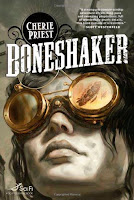I just finished reading through Year's Best SF 15, edited by David G. Hartwell and Kathryn Cramer (EOS, 2010) and wanted to record my thoughts on the volume, particularly regarding what nuggets about SF short story writing I can glean from it. I'll offer some general comments on the volume overall, and then I'll highlight a few individual stories and discuss what I think makes them especially successful.
(For my brief post on Year's Best SF 14, see here. I gave that volume as a whole 3 out of 4 stars.)
First, some details about the volume. Year's Best SF 15 contains twenty-four stories, with nine of those stories written by women (around 38%). Authors included range from veterans such as Bruce Sterling and Nancy Kress, to more recent but established names such as Alastair Reynolds and Peter Watts, to newer/up-and-coming writers such as Mary Robinette Kowal. Stories were published in 2009, and Hartwell and Cramer selected works from a variety of venues/markets: a collection published in India; magazines such as Asimov's Science Fiction, Fantasy & Science Fiction, Analog, and Interzone; anthologies of original stories such as Other Earths (Nick Gevers, ed.), The New Space Opera 2 (Gardner Dozois and Jonathan Strahan, eds.), and When It Changed (Geoff Ryman, ed.); online markets such as Strange Horizons. Asimov's wins the race with five stories, while a few venues are tied at three stories (e.g., Fantasy & Science Fiction, The Solaris Book of New Science Fiction 3). Only one online market was used for the volume, Strange Horizons, though the editors selected two stories from it. Nearly all subgenres of SF are represented: alternate history, space opera, alien encounters, hard SF, near future SF, parallel/enfolded timelines, artificial intelligence, multicultural/postcolonial, time travel, and so forth. Thus, a good range of authors and subgenres, with perhaps too few women writers and with a decidedly heavy emphasis on print markets.
Here are the stories and my ratings of them (out of four stars), with the five best stories in bold:
1. Vandana Singh, "Infinities" ***
2. Robert Charles Wilson, "This Peaceable Land; or, The Unbearable Vision of Harriet Beacher Stowe" *** 1/2
3. Yoon Ha Lee, "The Unstrung Zither" *** 1/2
4. Bruce Sterling, "Black Swan" *** 1/2
5. Nancy Kress, "Exegesis" *** 1/2
6. Ian Creasey, "Erosion" ** 1/2
7. Gwyneth Jones, "Collision" ***
8. Gene Wolfe, "Donovan Sent Us" ***
9. Marissa K. Lingen, "The Calculus Plague" * 1/2
10. Peter Watts, "The Island" ****
11. Paul Cornell, "One of Our Bastards Is Missing" ** 1/2
12. Sarah L. Edwards, "Lady of the White-Spired City" ***
13. Brian Stableford, "The Highway Code" ***
14. Peter M. Ball, "On the Destruction of Copenhagen by the War-Machines of the Merfolk" **
15. Alastair Reynolds, "The Fixation" ***
16. Brenda Cooper, "In Their Garden" ***
17. Geoff Ryman, "Blocked" ****
18. Michael Cassutt, "The Last Apostle" ***
19. Charles Oberndorf, "Another Life" ****
20. Mary Robinette Kowal, "The Consciousness Problem" *** 1/2
21. Stephen Baxter, "Tempest 43" ***
22. Genevieve Valentine, "Bespoke" ** 1/2
23. Eric James Stone, "Attitude Adjustment" ***
24. Chris Roberson, "Edison's Frankenstein" ***





